

In Our Time - 'Big Two-Hearted River' by Ernest Hemingway. Ernest Hemingway in 1923, two years before the publication of "Big Two-Hearted River" The story is one of Hemingway's earliest pieces to employ his Iceberg Theory of writing; a modernist approach to prose in which the underlying meaning is hinted at, rather than explicitly stated.
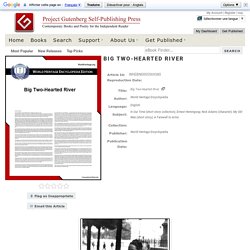
"Big Two-Hearted River" is almost exclusively descriptive and intentionally devoid of plot. Hemingway was influenced by the visual innovations of Cézanne's paintings and adapted the painter's idea of presenting background minutiae in lower focus than the main image. In this story, the small details of a fishing trip are explored in great depth, while the landscape setting, and most obviously the swamp, are given cursory attention. Contents Background and publication 1 Plot 2 Themes 3 War 3.1 Nature 3.2 Style 4 Iceberg theory 4.1 Cézanne 4.2 Symbolism 4.3 Reception 5 References 6 Citations 6.1 Sources 6.2 External links 7 Background and publication Plot Part one Part two Themes War Nature.
The Necklace by Guy de Maupassant. Youth: A Narrative by Joseph Conrad. The Yellow Wallpaper by Charlotte Perkins Gilman. Winter Dreams by F Scott Fitzgerald. Tomorrow and Tomorrow and Tomorrow by K Vonnegut Jr. To Build a Fire by J London. Day had broken cold and grey, exceedingly cold and grey, when the man turned aside from the main Yukon trail and climbed the high earth- bank, where a dim and little-travelled trail led eastward through the fat spruce timberland.
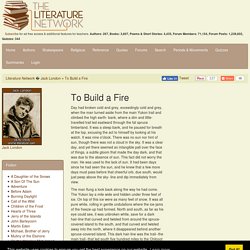
It was a steep bank, and he paused for breath at the top, excusing the act to himself by looking at his watch. It was nine o'clock. There was no sun nor hint of sun, though there was not a cloud in the sky. It was a clear day, and yet there seemed an intangible pall over the face of things, a subtle gloom that made the day dark, and that was due to the absence of sun. This fact did not worry the man. The man flung a look back along the way he had come. The Story of An Hour by Kate Chopin. Kate Chopin (1894) Knowing that Mrs.
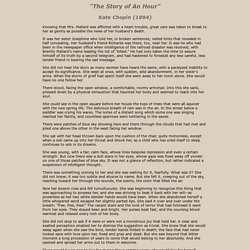
Mallard was afflicted with a heart trouble, great care was taken to break to her as gently as possible the news of her husband's death. It was her sister Josephine who told her, in broken sentences; veiled hints that revealed in half concealing. Her husband's friend Richards was there, too, near her. It was he who had been in the newspaper office when intelligence of the railroad disaster was received, with Brently Mallard's name leading the list of "killed. " She did not hear the story as many women have heard the same, with a paralyzed inability to accept its significance. Roman Fever by Edith Wharton.
The Other Side of the Hedge by E.M. Forster. By E.
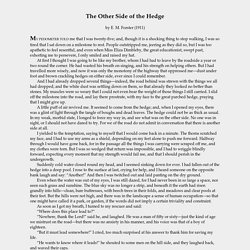
M. Forster (1911) MY PEDOMETER TOLD me that I was twenty-five; and, though it is a shocking thing to stop walking, I was so tired that I sat down on a milestone to rest. People outstripped me, jeering as they did so, but I was too apathetic to feel resentful, and even when Miss Eliza Dimbleby, the great educationist, swept past, exhorting me to persevere, I only smiled and raised my hat. At first I thought I was going to be like my brother, whom I had had to leave by the roadside a year or two round the corner. Edward Morgan Forster (1879-1970) was born in London and educated at King’s College, Cambridge. The Nose by Nikolai Gogol. ON 25 March an unusually strange event occurred in St.
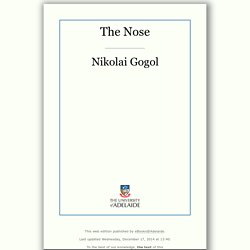
Petersburg. For that morning Barber Ivan Yakovlevitch, a dweller on the Vozkresensky Prospekt (his name is lost now — it no longer figures on a signboard bearing a portrait of a gentleman with a soaped cheek, and the words: “Also, Blood Let Here”)— for that morning Barber Ivan Yakovlevitch awoke early, and caught the smell of newly baked bread.
Raising himself a little, he perceived his wife (a most respectable dame, and one especially fond of coffee) to be just in the act of drawing newly baked rolls from the oven. “Prascovia Osipovna,” he said, “I would rather not have any coffee for breakfast, but, instead, a hot roll and an onion,”— the truth being that he wanted both but knew it to be useless to ask for two things at once, as Prascovia Osipovna did not fancy such tricks. “Oh, the fool shall have his bread,” the dame reflected. And duly she threw on to the table a roll. The Man Who Would be King by Rudyard Kipling. Love and Honour and Pity and Pride and Compassion and Sacrifice by Nam Le. Looking for Mr Green by Saul Bellow.
The Landlady by Roald Dahl. The Lady with the Dog by Anton Chekhov. Guests of the Nation by Frank O'Connor. The Guest by Albert Camus. The Garden of Forking Paths by Jorge Luis Borges. The Fall of the House of Usher by Edgar Allan Poe. By Edgar Allan Poe(published 1839) Print Version Son coeur est un luth suspendu; Sitot qu'on le touche il resonne.
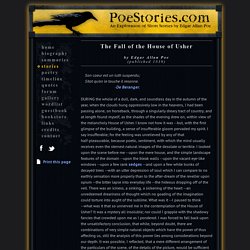
-De Beranger. The Death of Ivan Ilyich by Leo Tolstoy.